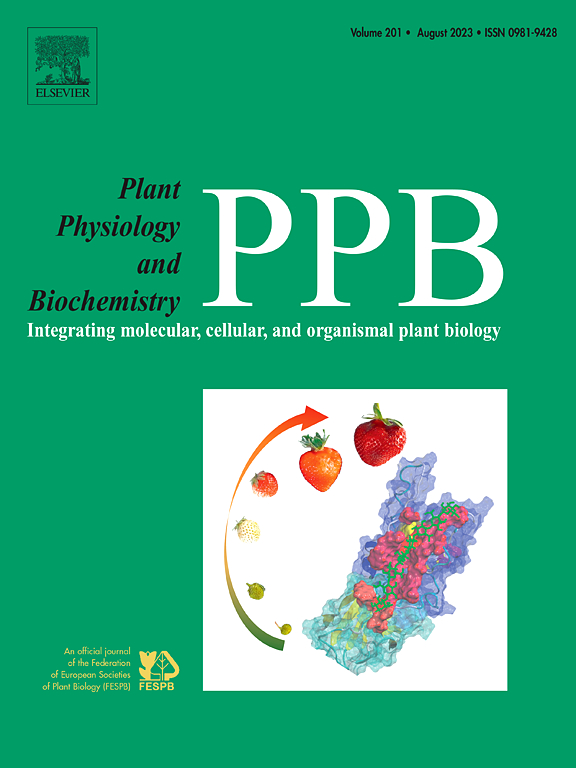A pumpkin heat shock factor CmHSF30 positively regulates thermotolerance in transgenic plants
IF 6.1
2区 生物学
Q1 PLANT SCIENCES
引用次数: 0
Abstract
Heat shock factors (HSFs) play a central role in regulating the responses of plants to various stresses. However, the function and regulation of HSFs in pumpkins remains largely unknown. In this study, an HSF, CmHSF30 was identified in Cucurbia moschata, which belongs to the HSFA subfamily. The expression level of CmHSF30 was significantly upregulated in response to heat stress and exogenous phytohormone treatments, including ABA, GA, IAA, and SA. The CmHSF30 was localized in the nucleus and functions as a transcriptional activator. By overexpressing CmHSF30 in Arabidopsis and pumpkin, the function and regulation of CmHSF30 in response to heat stress were studied. The overexpression of CmHSF30 in Arabidopsis enhanced plant thermotolerance by increased germination rate and survival rate under heat stress, as evidenced by the elevated of contents chlorophyll and GSH, and SOD activity, and decreased contents of H2O2 and MDA. Furthermore, the overexpression of CmHSF30 in pumpkins also enhanced the thermotolerance of transgenic pumpkins by reducing cell death. In contrast, CRISPR/Cas9 mediated knockout of CmHSF30 decreased pumpkin thermotolerance. Besides, RT-qPCR analysis revealed that CmHSF30 plays a positive role in regulating the expression of stress-related genes, including AtHSP18.2, AtHSP20, AtHSP70, AtPP2C, and AtMYB82 from Arabidopsis and CmHSP18.2, CmHSP20, CmHSP70, CmPP2C, and CmMYB46 from pumpkin. Yeast two-hybrid showed that CmHSF30 interacts with CmMYB46. The results indicate that CmHSF30 functions as a positive regulator, enhancing plant thermotolerance by regulating target genes and reducing ROS accumulation.
南瓜热激因子CmHSF30正调控转基因植株的耐热性
热休克因子在调节植物对各种胁迫的反应中起着核心作用。然而,在南瓜中,hsf的功能和调控在很大程度上仍然未知。本研究在Cucurbia moschata中鉴定出HSF CmHSF30,属于HSFA亚家族。CmHSF30在热应激和外源植物激素(ABA、GA、IAA和SA)处理下表达水平显著上调。CmHSF30定位于细胞核,起转录激活因子的作用。通过在拟南芥和南瓜中过表达CmHSF30,研究了CmHSF30在热胁迫下的功能和调控。CmHSF30在拟南芥中过表达,通过提高植物在热胁迫下的发芽率和存活率来增强植物的耐热性,表现为叶绿素和GSH含量升高,SOD活性升高,H2O2和MDA含量降低。此外,CmHSF30在南瓜中的过表达也通过减少细胞死亡来增强转基因南瓜的耐热性。相比之下,CRISPR/Cas9介导的敲除CmHSF30降低了南瓜的耐热性。此外,RT-qPCR分析显示,CmHSF30对拟南芥中的AtHSP18.2、AtHSP20、AtHSP70、AtPP2C和AtMYB82以及南瓜中的CmHSP18.2、CmHSP20、CmHSP70、CmPP2C和CmMYB46等应激相关基因的表达具有正向调节作用。酵母双杂交表明,CmHSF30与CmMYB46相互作用。结果表明,CmHSF30具有正向调节作用,通过调控靶基因和减少ROS积累来增强植物的耐热性。
本文章由计算机程序翻译,如有差异,请以英文原文为准。
求助全文
约1分钟内获得全文
求助全文
来源期刊
CiteScore
11.10
自引率
3.10%
发文量
410
审稿时长
33 days
期刊介绍:
Plant Physiology and Biochemistry publishes original theoretical, experimental and technical contributions in the various fields of plant physiology (biochemistry, physiology, structure, genetics, plant-microbe interactions, etc.) at diverse levels of integration (molecular, subcellular, cellular, organ, whole plant, environmental). Opinions expressed in the journal are the sole responsibility of the authors and publication does not imply the editors'' agreement.
Manuscripts describing molecular-genetic and/or gene expression data that are not integrated with biochemical analysis and/or actual measurements of plant physiological processes are not suitable for PPB. Also "Omics" studies (transcriptomics, proteomics, metabolomics, etc.) reporting descriptive analysis without an element of functional validation assays, will not be considered. Similarly, applied agronomic or phytochemical studies that generate no new, fundamental insights in plant physiological and/or biochemical processes are not suitable for publication in PPB.
Plant Physiology and Biochemistry publishes several types of articles: Reviews, Papers and Short Papers. Articles for Reviews are either invited by the editor or proposed by the authors for the editor''s prior agreement. Reviews should not exceed 40 typewritten pages and Short Papers no more than approximately 8 typewritten pages. The fundamental character of Plant Physiology and Biochemistry remains that of a journal for original results.

 求助内容:
求助内容: 应助结果提醒方式:
应助结果提醒方式:


